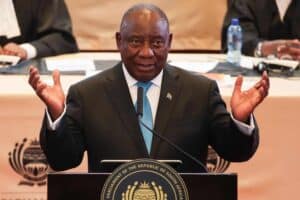The minister said the IEC still had to complete its preparations for the elections after the ConCourt decision.

President Cyril Ramaphosa will announce the date of next year’s general elections once the necessary processes have concluded, says Minister in the Presidency Khumbudzo Ntshavheni.
Political parties have called on Ramaphosa to formally announce the 2024 election date as the year draws to a close.
Some parties have already raised concerns about the delay in announcing the date as this was prejudicing their election campaign preparations.
President’s prerogative
Speaking during a media briefing in Pretoria on Monday regarding the outcomes of a special Cabinet meeting, Ntshavheni suggested that Cabinet did not discuss the announcement of an election date as the decision lay exclusively with Ramaphosa.
“The Constitution leaves strictly between the president and the IEC [Electoral Commission of South Africa] that they must consult each other, and the president must then determine the election date.
“That election date, there is a prescribed period in terms of our laws to say it must be within which timeframe after the last elections were held. So we don’t want the president in trouble of violating his oath of office or Cabinet influencing his decision to determine the election date [which] remains the sole prerogative of the president,” she told reporters.
The minister emphasised that the IEC still had to complete its preparations for the elections in light of the recent decision made by the Constitutional Court (ConCourt).
ALSO READ: Pressure on Ramaphosa to announce election date
“There’s still work that needs to be done. I’m sure the IEC, when they finalise their work to prepare for the elections, will then brief and update the president, who will then determine the election date. So we must not rush for the election date; we must allow all the work that has to be done by the IEC, which also depends on the court challenges, to be finalised and give the president time and space to determine the election date,” Ntshavheni added.
The ConCourt last week delivered its judgment on the Electoral Amendment Act, declaring a provision of the law relating to the threshold of voters’ signatures unconstitutional and invalid.
The Act, which paves the way for independent candidates to contest provincial and national elections, was signed into law by Ramaphosa in April.
Watching the briefing below:
The IEC has already indicated that it put in place the regulations necessary to give practical effect to revisions of the electoral system in the light of the ConCourt judgement.
The commission previously warned the court case could “imperil” the quality of the upcoming elections.
Since the term of office of the current government ends around May, South Africa is required to hold elections within 90 days of the expiration date in terms of the Constitution.
READ: 2024 elections: IEC looking to counter ‘threat’ of fake news
According to the commission, the elections could take place between May and August 2024 if Ramaphosa makes a proclamation by early February.
In consultation with the IEC, the president must determine the election date.
Meanwhile, a panel that will be tasked with considering greater electoral reform is expected to be established after the 2024 elections.
Second voter registration weekend
Furthermore, the IEC has confirmed the date of the second voter registration weekend, which will take place on 3 and 4 February.
More than 23,200 voting stations across all provinces will open for two days to allow citizens to register and to update their details before the country goes to the polls.
South Africans living abroad can register to vote at various high commissions, embassies and consulates between 26, 27 and 28 January.
The IEC will also register inmates in the correctional centres between 30 January and 1 February.
There are more than 26.8 million eligible voters on the voters’ roll.
According to the IEC, at least 2.9 million people registered to vote during the first registration weekend.
NOW READ: Parliament to look for more nominees to serve on electoral reform panel
Support Local Journalism
Add The Citizen as a Preferred Source on Google and follow us on Google News to see more of our trusted reporting in Google News and Top Stories.






